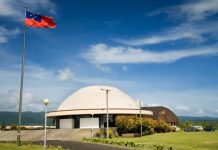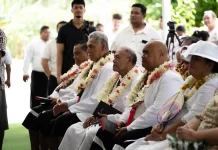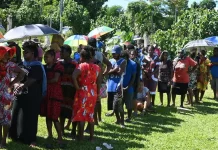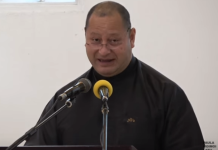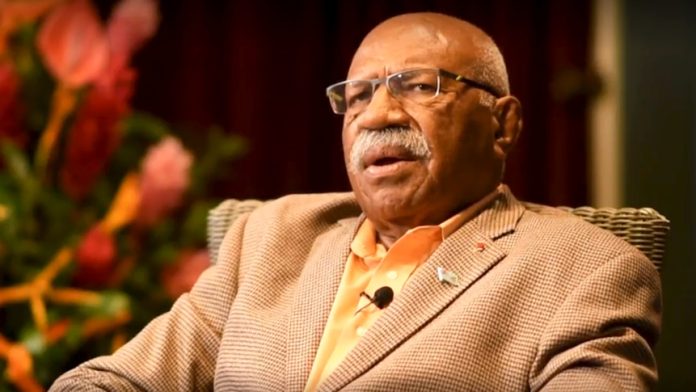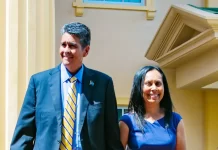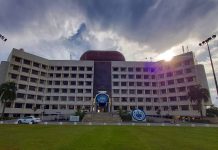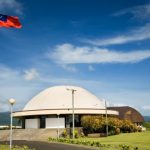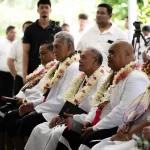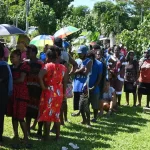Fiji prime minister Sitiveni Rabuka is investigating claims by a senior Pacific leader that the Chinese government spied on him while he was visiting Fiji.
In an exclusive interview with the ABC’s The Pacific programme, Rabuka, who ended Frank Bainimarama’s 16-year rule after winning the nation’s December election, also weighed in on the future threats for the region, saying “survival” in the face of climate change remains the key issue facing Pacific nations.
He also fielded several questions about China’s role in the Pacific as the strategic geopolitical tension in the region — and Fiji — continues to intensify.
China and Fiji have had a longstanding relationship, with security and policing deals between the countries stretching back more than a decade.
But Bainimarama began edging away slightly from China during his last few years in office. That shift has been even more pronounced under Rabuka, who moved to cancel a key police agreement with China earlier this year, citing stark differences between the two countries’ legal systems.
His government also recently allowed Taiwan to re-use its official name for its office in Fiji, angering Chinese diplomats.
In the interview, the 74-year-old former coup leader, now in his third stint as Fiji’s prime minister, said China should continue to play the role of “development partner”.
He told the ABC that China should not “use” the Pacific as part of a powerplay in the region — though he was quick to clarify he did not believe China was “intentionally using” the Pacific for that reason.
Rabuka said Fiji and other Pacific nations should continue to “exercise sovereignty” and conduct diplomatic relations in accordance with the “conventions of the world”.
On the issue of sovereignty, Rabuka said his government was investigating claims from the president of the Federated States of Micronesia’s (FSM) David Panuelo’s that Chinese spies followed him during a recent trip to Fiji.
The ABC understands the government is looking at whether allegations are criminal in nature, or whether the matter should remain within diplomatic channels.
Rabuka stressed the allegations are not proven, but said if they were, then it would be a “concern” for Fiji.
“We are responsible for everyone who comes into Fiji and we should be looking after their interest until they leave our our sovereign territory,” he said.
“So for someone to feel threatened by another power while in the dominion of Fiji, is … it’s almost a slap in the face.”
Rabuka this week celebrated his 1OOth day in office, following a controversial election that saw tense negotiations to form a coalition government, and a police request for military assistance amid unsubstantiated claims of widespread violence.
The Fiji prime minister, who described his years away from the spotlight as a “period of preparation” described his prime ministership as having “a personal touch” and said he was focusing on reviving his country’s flagging economy.
Rabuka, who sees himself as a father figure and leader of the Pacific region, was also credited as being the linchpin in reunifying the the Pacific Islands Forum after years of disunity.
Domestically, he has announced plans to repeal the country’s contentious media laws and has moved to allow more open debate in Fiji after what civil society groups have described as years of intimidation under the former government’s rule.
But his first 100 days have not been without controversy.
Bainimarama, then-opposition leader, was suspended from parliament for three years after delivering a speech deemed “seditious”.
The former prime minister then spent an evening in custody after being arrested and charged last month with abuse of office, triggering fears of retribution from Bainimarama’s followers — who remain a significant chunk of the country.
Bainimarama was released on bail, saying he would fight the charge “for democracy”.
Rabuka dismissed claims his government was putting extra resources into the police to pursue Bainimarama, saying they are “doing what they normally do”.
Speaking on Australia’s role in the region, Rabuka said the country was an integral part of the “modern Pacific”, helping in the “collective development” and “collective security” of the region.
But, he said, from his perspective, that wasn’t always the case.
“At one stage I was not happy with the way Australia was conducting its affairs and I spoke out very strongly against them,” he said.
That seemed to be a reference to the tensions raised by Rabuka’s military coup in 1987. Australia responded by cancelling military cooperation and suspending foreign aid, although it did not move to impose any sanctions on Rabuka’s regime.
Rabuka has since apologised for the coup, and he told the ABC that Fiji’s relationship with Canberra was now on a strong footing.
“We cannot change history. We are here, and they are now part of the Pacific community.
“And that’s the way I feel Australia is conducting its affairs, and I have no reason to doubt their sincerity, or that they’re making themselves [a] stronger friend in the area.”
Rabuka met with Prime Minister Anthony Albanese last month, with the duo discussing Australia’s AUKUS agreement — an arrangement some Pacific leaders have criticised.
But Fiji’s prime minister has backed the Australian government’s push for nuclear powered submarines under the pact, calling it a “sovereign decision by Australia” and the U.S and UK.
“For us to have a strong friend is not a bad thing,” he said.
Rabuka also spoke about his plans to revive Fiji’s tourist-dependent economy, which was decimated during the COVID pandemic.
Tourists have returned in droves — in some cases breaking records — and the country is slowly re-emerging from its COVID slump.
Yet, inflationary pressures continue to take a heavy toll on family budgets and local businesses in the country, with cost-of-living pressures biting hard.
“We are really struggling,” Rabuka said when asked to asses the state of the country’s economy.
“There is a big, huge trough here, [so how] do you get out of it? And those are the things we really should be talking about.
“There’s a lot of good in the country, a lot of good in the people in the country. We are very energetic, we are very productive and innovative.”
Looking to the future of the region, Rabuka was resolute when asked about the key issue facing the Pacific.
“Right now? Survival,” he said.
“And when you talk about survival, survival of the landmass that we live on our islands, when we consider climate change, and the rising sea levels, you’re talking about the disappearance of our very livelihood in the Pacific, and a lot of emphasis should go to that,” said Rabuka.
SOURCE: ABC PACIFIC/PACNEWS


